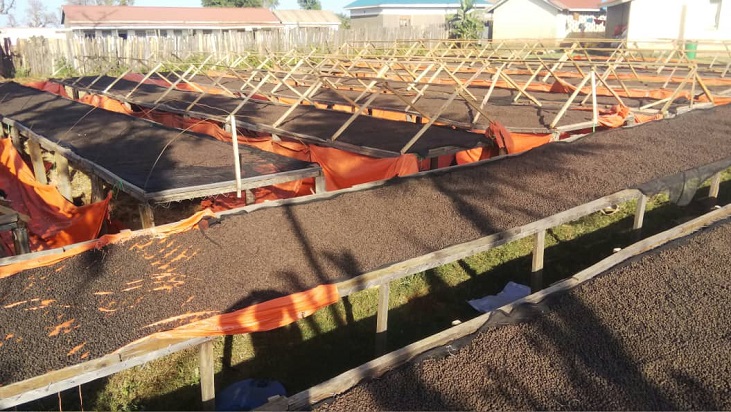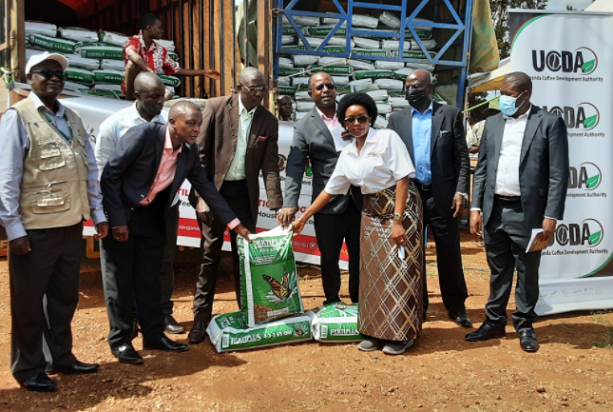Coffee is Uganda’s leading cash crop and a top foreign exchange earner
By Ian Clerk
I have now left London (and the cold weather) and am back in Uganda. I met all kinds of interesting people in the coffee sector at the London Coffee Festival and also had the opportunity to visit a large coffee distributor plus two roasteries. The visit has given me a better sense of the complete coffee value chain and helped me assess how Uganda can maximise its place in that chain. Coffee prices are currently at an all-time high, both for Robusta and Arabica. The increase in Robusta prices is due to a fall in Vietnamese and Indian production which is good for Ugandan coffee producers.
The coffee value chain starts with the farmer, either the commercial farmer, or the small farmer. The coffee is then bought by small traders or sold to the local coffee factory which hulls the coffee and also sells it to traders.
The large traders sell it to the coffee factories in Namanve which clean, sort and grade the coffee for export. There are still some local coffee factories which buy the coffee and export it, but increasingly they have been squeezed out by the multinationals. The exporters sell to distributors in various countries which buy container lots of 20 tons, store the coffee in their warehouses and sell in smaller quantities to roasters.
The roasters then sell the roasted coffee to coffee shops or supermarkets. A cup of coffee sells at around $3 – $4 and takes about 10 -15 grams of roast coffee for one cup, so 1Kg of roast coffee should produce 70 cups of coffee.
One Kilo of roast coffee will be sold by the roasters at $25 – $30. A Kilo of green coffee will be sold by the distributors at around $10- $15. The distributor will have paid the exporter between $4 and $8 per Kg depending on the quality.
Therefore, the business that makes the largest margin is the coffee shop (or the barista) since he buys a kilo of coffee for $30 and sells 70 cups of coffee at $210. But the coffee shop is at the end of the value chain and, unless it is part of a big group such as Starbucks or Costa Coffee, it will sell a relatively small amount of coffee – a few kilos every day, and a coffee shop has expensive overheads such as staff and rent.
The distributor will make money according to his turnover since, if he sells two or three hundred containers of green bean coffee on a smaller margin, he will make much more money than the coffee shop.
The exporter may have an even smaller margin, but the global market for coffee is controlled by a handful of international exporters with offices in all the coffee producing countries with sales of hundreds of millions of dollars.
The exporters face risks because they must borrow millions of dollars to buy coffee from the traders, plus they commit to forward contracts from the distributors.
Thus, if they forward sell coffee at $3.50 and can buy it at $3.0 they make money, but if the price rises rapidly by the time their contract is due they will lose money.
And if the banks don’t like the risk, they can simply withdraw their facilities, leaving the company insolvent. Rapid increases in coffee prices are not favourable to the global coffee companies.
Meantime the farmer is at the bottom of the food chain and although higher world prices of coffee will certainly benefit him, most of our farmers are very small scale so they benefit only a little. Also, if the farmer has not looked after his coffee his yields will be low. Those who have steadily invested in expanding their acreage stand to benefit more.
While I was at the London Coffee Festival, I found a trend for roasters and coffee shops to claim that they are helping the small farmers, yet most of them have nothing to do with farmers since they buy from distributors. Distributors want to stock the coffee that is in demand from the roasters. The roasters in turn want to roast what the customer wants but if the customer has never heard of Ugandan coffee, he will not ask for it. This is why it was important that Uganda had a presence at the London Coffee Festival – so that customers become familiar with Ugandan coffee and get to know that Uganda produces good coffee.
Ugandan is the biggest coffee producer that you have never heard of.
The author is a prominent coffee farmer and entrepreneur





